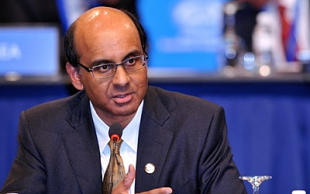- Joined
- Sep 23, 2008
- Messages
- 8,852
- Points
- 0
GST will not go up in next 5 years: Finance Minister

Finance Minister Tharman Shanmugaratnam has dispelled rumours of a goods and services (GST) hike after the General Election on 7 May.
Speaking to reporters, he said, "We have got a solid Budget, we have got a disciplined Budget, and there is absolutely no reason why we should raise the GST."
The MP for Jurong GRC added that "at least for five years there is absolutely no reason to raise the GST" so "let's put that rumour to rest".
Introduced in 1994, the GST is a broad-based consumption tax which started out at 3 percent, and is now set at 7 percent.
It contributed S$7.9 billion, or about 17 percent of tax revenue for the 2010 financial year.
This is not the first time the issue has been raised in recent months.
On 12 April, Prime Minister Lee Hsien Loong, responding to a TV forum viewer's concern that the GST will increase after the elections, said, "I very much doubt that. Unless we go wild on our spending plans, then of course we will run out of money, and then you will have to raise the GST."
Workers' Party chief Low Thia Khiang called for GST to be reduced to 5 percent in the Budget debate last month.
At that time, Mr Tharman called it a "wrong solution", and added that the tax helps the government to fund various bursaries and grants -- workfare bursaries, housing grants, subsidies -- to help the lower- and middle-income groups.
Lowering the GST may mean taking away these initiatives, he said.
Opposition parties have also been discussing the issue of a GST raise.
In a video released last week, Singapore Democratic Party (SDP) leader Chee Soon Juan gave a speech in Hokkien and said that in no uncertain terms that "GST will go up after the elections", The Straits Times reported.
The National Solidarity Party (NSP), which has confirmed its contest in Jurong GRC, also called for a GST reduction in its election manifesto.
Mr Tharman explained that the tax should be seen in the context of workfare and other bursaries and subsidies that Singaporeans get.
"When you add up what the lower-income group has received after we raised the GST from 5 percent to 7 percent, the low-income group received S$5 back for every extra dollar they paid in GST ," he said.
," he said.
"So, the GST is actually a way in which we are helping the poor and helping the middle-income group as well, to some extent. It is actually a very fair scheme," he added.
and helping the middle-income group as well, to some extent. It is actually a very fair scheme," he added.
While GST by itself is regressive, GST plus, which is the motivation for the GST here, is a highly progressive scheme, he said.
"It's a redistribution scheme where we collect a very significant amount of revenue. It is a very efficient tax, from a large base with the bulk of it coming from the high-end companies and foreigners, and we use it to subsidise the poor and to some extent the middle-income group."
However, he did not rule out a GST hike in the long-term future.
"I don't think any Finance Minister worth his salt will say that 10 or 20 years from now, whoever is the Finance Minister should not raise some tax. That will be completely irresponsible," he said.

Finance Minister Tharman Shanmugaratnam has dispelled rumours of a goods and services (GST) hike after the General Election on 7 May.
Speaking to reporters, he said, "We have got a solid Budget, we have got a disciplined Budget, and there is absolutely no reason why we should raise the GST."
The MP for Jurong GRC added that "at least for five years there is absolutely no reason to raise the GST" so "let's put that rumour to rest".
Introduced in 1994, the GST is a broad-based consumption tax which started out at 3 percent, and is now set at 7 percent.
It contributed S$7.9 billion, or about 17 percent of tax revenue for the 2010 financial year.
This is not the first time the issue has been raised in recent months.
On 12 April, Prime Minister Lee Hsien Loong, responding to a TV forum viewer's concern that the GST will increase after the elections, said, "I very much doubt that. Unless we go wild on our spending plans, then of course we will run out of money, and then you will have to raise the GST."
Workers' Party chief Low Thia Khiang called for GST to be reduced to 5 percent in the Budget debate last month.
At that time, Mr Tharman called it a "wrong solution", and added that the tax helps the government to fund various bursaries and grants -- workfare bursaries, housing grants, subsidies -- to help the lower- and middle-income groups.
Lowering the GST may mean taking away these initiatives, he said.
Opposition parties have also been discussing the issue of a GST raise.
In a video released last week, Singapore Democratic Party (SDP) leader Chee Soon Juan gave a speech in Hokkien and said that in no uncertain terms that "GST will go up after the elections", The Straits Times reported.
The National Solidarity Party (NSP), which has confirmed its contest in Jurong GRC, also called for a GST reduction in its election manifesto.
Mr Tharman explained that the tax should be seen in the context of workfare and other bursaries and subsidies that Singaporeans get.
"When you add up what the lower-income group has received after we raised the GST from 5 percent to 7 percent, the low-income group received S$5 back for every extra dollar they paid in GST
 ," he said.
," he said."So, the GST is actually a way in which we are helping the poor
 and helping the middle-income group as well, to some extent. It is actually a very fair scheme," he added.
and helping the middle-income group as well, to some extent. It is actually a very fair scheme," he added.While GST by itself is regressive, GST plus, which is the motivation for the GST here, is a highly progressive scheme, he said.
"It's a redistribution scheme where we collect a very significant amount of revenue. It is a very efficient tax, from a large base with the bulk of it coming from the high-end companies and foreigners, and we use it to subsidise the poor and to some extent the middle-income group."
However, he did not rule out a GST hike in the long-term future.
"I don't think any Finance Minister worth his salt will say that 10 or 20 years from now, whoever is the Finance Minister should not raise some tax. That will be completely irresponsible," he said.


